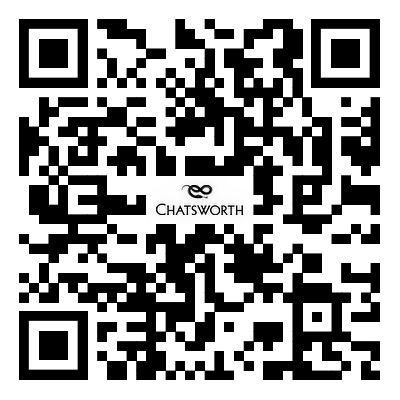Last summer, researcher and pianist, Elizabeth French, visited Chatsworth to perform a selection of music found in the Archives for Chatsworth Patrons.
From waltzes to rallying revolutionary anthems, it was the first time in centuries that many of the pieces had been played at Chatsworth.
Before the age of recording, if you liked a piece of music, the only way to listen to it again was to write it down, so it’s no surprise that the archive contains several volumes of hand-written music scores.
While most of the musical scores in the archive belonged to the 6th and 7th Dukes of Devonshire and the 7th Duke’s family, there is also a slim brown leather-bound book with a worn stamp, probably at one time gilded, carrying the initials ‘GD 1795’. This volume is believed to have belonged to Georgiana, Duchess of Devonshire (1757-1806).

The dated items in the volume are from 1789-94, and, in a wonderful piece of detective work by Elizabeth French and the Chatsworth Archive team, they have been able to chart when and where Georgiana may have heard these pieces based on letters sent by her and others over this period, and historical events taking place in the locations where she was living or travelled.
This timeline provided the basis for a talk given to Chatsworth Patrons at the end of September, where they were able to hear some of the pieces performed by Elizabeth and take a close look at Georgiana’s letters.
These five years were a tumultuous period in Georgiana’s life; she gave birth to her long-awaited son, was exiled to France by her husband, the 5th Duke, after becoming pregnant following an extra-marital affair with Charles Grey, later 2nd Earl Grey, and gave birth to an illegitimate daughter, who had to be given up to Grey’s parents to raise. All of this took place against the backdrop of the French Revolution and other major political upheavals on the continent, where she was living.
Revolutionary French politics has, according to C. Alexander McKinley, a long and rich history of song culture. Georgiana, as she travelled through France at this time, would have witnessed the Revolution happening in front of her.
Several of Georgiana’s letters provide accounts of riots, including one sent to her mother, Countess Spencer, from Spa on 18 July 1789:
“… upon our arrival here we found no letters & we pass’d a few hours in the greatest uneasiness – at last the post came in, and we had a comfortable letter from Nagel – he says it’s very true that the night of the 13th & the day of the 14th were dreadful; aux armes cry’d in every street; the mad populace armed with pistols, swords & bayonets – no soldiers dar’d appear…he says on the 14th the respectable bourgeoisie of Paris had taken arms to preserve the peace…”
She writes on 19 July: “..the news we got today is horrid - 400 people put to death by the Governor of the Bastille…”
A letter from Georgiana, Duchess of Devonshire, to her mother, Countess Spencer, sent July 1789
It is unsurprising that several songs, now described as ‘the ubiquitous sounds of the revolutionary era’, appear in Georgiana's music book. The songs were well-known to the French population from the 1790s onwards and were still in use well into the 20th Century.
An example is ‘Ca Ira’, which was first written as a song for the Fête de la Fédération in July 1790, celebrating the first anniversary of the storming of the Bastille. It was so popular, that a ship of the line, previously called ‘La Couronne’, was renamed ‘Ca Ira’ in 1792.

The song stayed in the repertoire of the French population, and was used by anarchists from the 1880s to the outbreak of WWI (both in the original and with new words).
The original text, in simple terms, states that ‘everything will be fine’, with many verses explaining this in great detail. While only later versions include the idea of hanging aristocrats from lamp posts, the original, from 1790, has a verse that says:
Ah! It'll be fine, It'll be fine, It'll be fine
When the aristocrat shall protest,
The good citizen will laugh in his face without troubling his soul,
And will always be the stronger.
In the film below, Elizabeth French performs 'Ca Ira' on the grand piano in the Ante-room at Chatsworth.
This blog is an extract from a talk given to Patrons of Chatsworth at an intimate music and archives evening held in the house in September 2024.
Find out more about our Patrons of Chatsworth scheme and other ways you can support the work of the Chatsworth House Trust charity by visiting the links below:
About Chatsworth House Trust
Chatsworth House Trust is a registered charity established in 1981 to improve and maintain the house, collections, garden, woodlands and park for the benefit of everyone.
Support our Cascade Campaign
The Cascade has been delighting visitors to Chatsworth since 1696 but is now in need of urgent repair. Learn more about our fundraising campaign 'Celebrating the Cascade'.
Donate online
If you can, support us by making a one-off or regular donation to the Chatsworth House Trust charity online.
Chatsworth Friends
Support the work of the charity while benefitting from unlimited visits, free tickets to events and discounts on shopping, dining and stays.
Gift Aid
When you use Gift Aid, the government gives an extra 25% on top of your kind donation, in lieu of tax you have already paid. All of this money goes directly to Chatsworth House Trust.
Patrons of Chatsworth
Patrons play a vital role in supporting the long-term stewardship of Chatsworth and enjoy exclusive access to the collections and curatorial team via special events.






